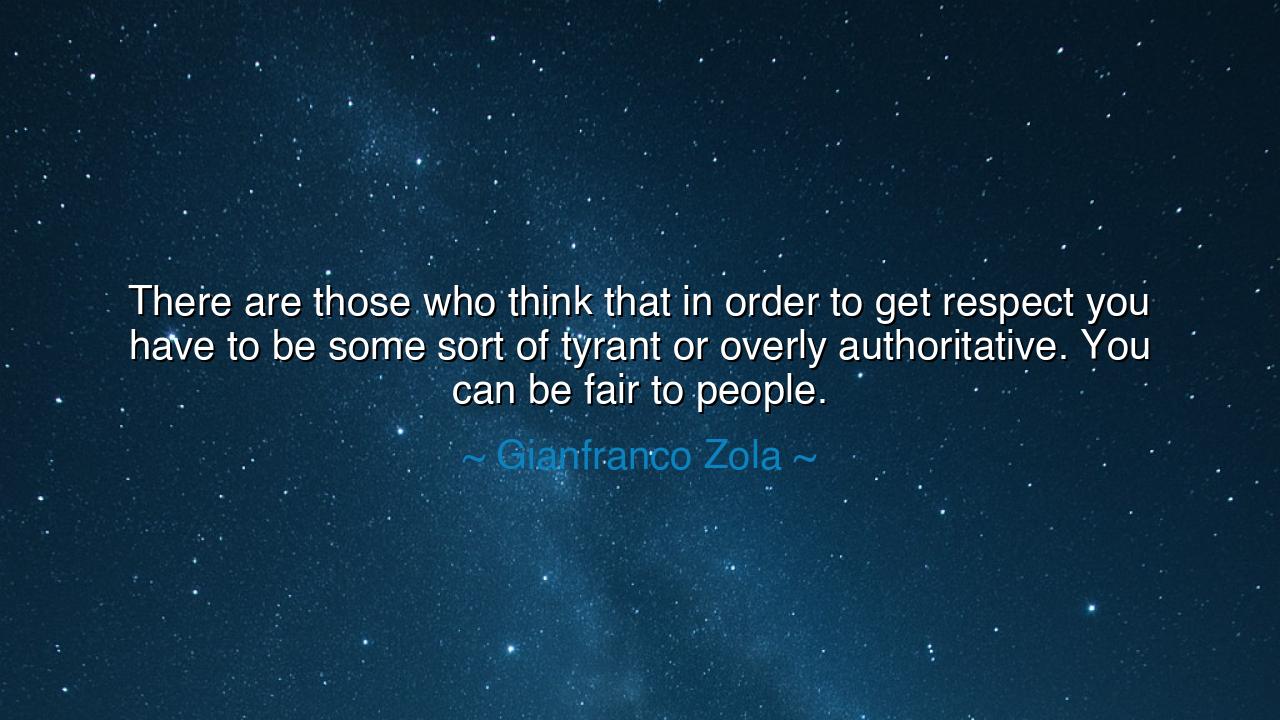
There are those who think that in order to get respect you have
There are those who think that in order to get respect you have to be some sort of tyrant or overly authoritative. You can be fair to people.






In the humble yet noble words of Gianfranco Zola, there resounds a truth that has echoed through the ages: “There are those who think that in order to get respect you have to be some sort of tyrant or overly authoritative. You can be fair to people.” It is a statement both gentle and powerful, as if spoken by a man who has walked among greatness and learned that leadership does not roar — it listens. Beneath its calm surface lies a message of timeless wisdom: that true respect is not commanded by fear, but earned through fairness, through the quiet strength of integrity and compassion.
The meaning of this quote lies in its defiance of false strength. In every age, there have been those who believe that power must be hard, that authority must be cold, and that to lead one must dominate. But Zola, a master both of football and of human character, reminds us that this is a misunderstanding of greatness. Respect and fear are not the same, though many confuse them. Fear compels obedience, but only for a time; respect inspires loyalty, and it endures. The tyrant may control men’s actions, but the fair and kind leader wins their hearts. And in that, there is a strength no tyranny can match.
The origin of these words can be found in Zola’s own life and career. As a player, he was known not for arrogance, but for grace — both in skill and in spirit. He was small in stature but immense in presence; admired by teammates and rivals alike for his humility and professionalism. Later, as a coach, he carried these same principles into leadership. He understood that the locker room, like the world itself, thrives not under domination, but under mutual respect. His players followed him not because they feared punishment, but because they trusted his fairness. Zola’s leadership was proof that gentleness, when paired with conviction, is mightier than cruelty wrapped in command.
This truth is as old as civilization itself. The ancient philosophers knew that to rule wisely was not to coerce but to harmonize. Confucius taught that “he who rules by virtue is like the north star — it remains in place, and all the other stars revolve around it.” Likewise, the great Roman emperor Marcus Aurelius led not with an iron hand, but with the discipline of reason and empathy. Amid the chaos of empire, he wrote in his Meditations: “The best revenge is to be unlike him who performed the injury.” Both men, like Zola, saw that justice without arrogance and authority without cruelty are the marks of true power.
History, too, offers lessons in the contrast between tyranny and fairness. Consider the story of King Ashoka of India. Once a fierce conqueror, he bathed the land in blood until he saw the emptiness of his victory. Stricken with remorse, he turned to the path of compassion, governing henceforth with kindness, peace, and wisdom. Under his fair rule, his people prospered, and his name became a synonym for benevolence. His story teaches what Zola’s words affirm: that kindness and fairness do not weaken authority — they sanctify it. For the ruler who listens, who forgives, who stands for justice without pride, becomes not only a leader of men but a guardian of their dignity.
Zola’s words are also a reflection of self-mastery. To be fair, one must first overcome the desire to dominate — that ancient impulse to assert one’s will through force. It is far easier to command by fear than to earn through example. But the wise know that fairness is not weakness; it is control of the self. The fair man is not swayed by anger or ego. He leads with balance, seeing others not as instruments of his power but as partners in his purpose. This is the essence of noble leadership — to wield authority not as a weapon, but as a responsibility.
The lesson we may draw from this teaching is both simple and profound: be strong, but be kind. Whether you are a leader, a teacher, a parent, or a friend, remember that respect is born from fairness. Speak with firmness when truth demands it, but temper judgment with understanding. Do not mistake fear for strength, nor humility for weakness. Treat those who follow you as equals in worth, even if not in role. For the one who rules with fairness builds loyalty that no fear can match, and the one who respects others will, in turn, be respected by them.
So let the words of Gianfranco Zola echo as a guiding star: you can be fair to people, and still be respected. Let us reject the tyranny of pride and embrace the discipline of fairness. Let our power be gentle, our authority just, and our strength rooted in compassion. For the world does not remember the tyrant who ruled with fear — it remembers the leader who led with heart.






AAdministratorAdministrator
Welcome, honored guests. Please leave a comment, we will respond soon